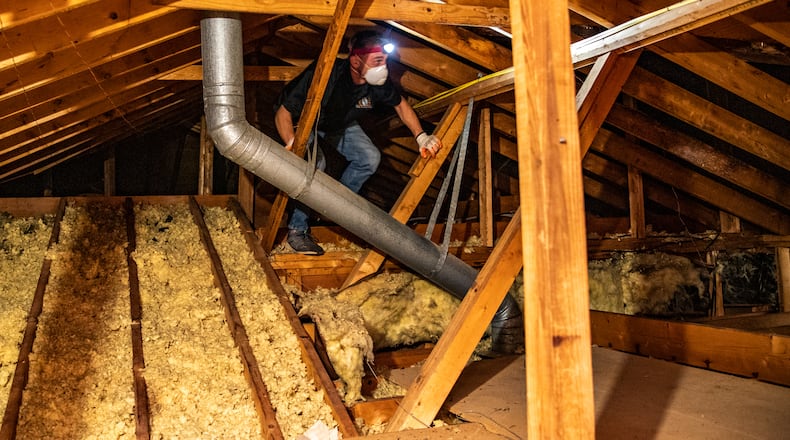Insulating your home and switching to clean, energy-efficient appliances are tried and true methods to save money on your power bills and stay comfortable. Now, a new federal rebate program available in the Peach State will make it cheaper for Georgians to make those upgrades.
On Wednesday, the U.S. Department of Energy and the Georgia Environmental Finance Authority announced the launch of two new pilot programs in the state to help reduce the cost of a range of home energy improvements.
Georgia is receiving just under $220 million to distribute to homeowners and renters who make the upgrades. The money comes from an $8.8 billion pot of federal funds to boost energy efficiency in states and tribes across the country by the Inflation Reduction Act, President Joe Biden’s signature climate and health law.
Homes and buildings in the U.S are responsible for a large chunk of the country’s energy use and overall greenhouse gas emissions. Curbing that is seen as a critical pathway to limiting climate change.
The residential sector consumes 21% of all energy used in the country each year, according to the DOE. In turn, homes and commercial businesses combined are to blame for 36% of annual emissions in the U.S. A little over half that pollution comes from residential energy use alone, the agency says.
In a news release, Keishaa Austin, the principal deputy director of the DOE’S Office of State and Community Energy Programs, cheered the launch of Georgia’s program, which is geared mostly toward low- and middle-income households.
“Big savings are coming to the Peach State,” Austin said. “Starting today, Georgians can save up to $16,000 on energy-saving upgrades under the Home Energy Rebate programs.”
The pilot programs will run through the first quarter of 2025. For now, Georgia’s rebates will only be offered through a limited number of state-approved contractors and are only available for owners and tenants in single-family residences. Owners and tenants of individual units in multifamily buildings can participate, though tenants will need owner approval, said Shane Hix, GEFA’s director of public affairs. Owners of multifamily buildings are not eligible.
Next year, GEFA is expected to open up eligibility to multifamily buildings and more contractors, plus offer rebate access through retailers and for handy homeowners who do installations themselves.
Here’s what you need to know about the programs, who’s eligible and how much you may be able to save.
Home Efficiency Rebates Program
The Home Efficiency Rebates Program offers owners and residents in single-family housing the chance to save money on retrofitting their homes to reduce energy use.
For interested participants, the first step is obtaining a home energy assessment from a licensed auditor to determine the scope of work needed.
Any Georgian in a single-family home is eligible to apply, but the size of the rebates are based on how much energy use can be slashed and how household earnings compare to the area’s median income, or AMI.
To be eligible for rebates, efficiency upgrades need to trim energy consumption by at least 20%. To get the full rebate, energy use would need to be cut by at least 35%.
Here’s the breakdown of how much homeowners and tenants could potentially save:
- $16,000 for households earning less than 80% of their AMI.
- $4,000 for households making 80% or more of their AMI.
Home Electrification and Appliance Rebates Program
The second pilot program offers rebates for households to make the switch to a range of more efficient, climate-friendly appliances.
Each household’s savings are capped at $14,000, with exact rebate amounts determined by the applicant’s AMI. Here are the maximum potential rebate amounts for different appliances:
- $8,000 for ENERGY STAR-certified heat pumps. Heat pumps are an all-in-one alternative to air conditioners and furnaces that move air from the outside in — or vice versa — to heat and cool homes.
- $4,000 for a new electrical panel.
- $2,500 for electrical wiring.
- $1,750 for ENERGY STAR-certified heat pump water heaters.
- $1,600 for insulation, air sealing and ventilation improvements.
- $840 for ENERGY STAR-certified electric stoves, cooktops, ranges or ovens.
- $840 for ENERGY STAR-certified electric heat pump clothes dryers.
There may be some urgency for interested homeowners to capitalize on the rebates now.
President-elect Donald Trump has criticized climate-friendly federal funding and has indicated he may try to cut some programs, but has offered few specifics about which spending he will target. It was not clear whether Georgia’s funding allocation could be clawed back by the incoming Trump administration or by legislation passed by the GOP-controlled Congress.
In response to questions about the funding’s vulnerability, DOE deputy press secretary Chris Ford said the agency “will continue to follow the law and provide American households with energy- and money-saving benefits.”
GEFA’s Hix said the federal funding Georgia receives “is approved by Congress and the president with oversight by U.S. DOE and U.S. EPA.”
“We implement the programs and funding at their discretion,” Hix added.
You can learn more about Georgia’s program and apply for rebates at the state’s newly launched website, energyrebates.georgia.gov.
A note of disclosure
This coverage is supported by a partnership with Green South Foundation and Journalism Funding Partners. You can learn more and support our climate reporting by donating at ajc.com/donate/climate.
About the Author





